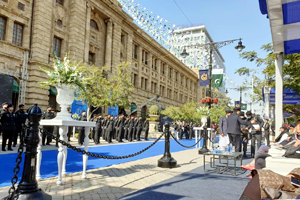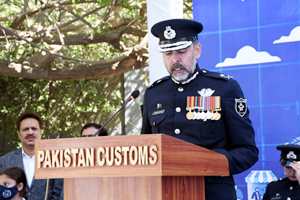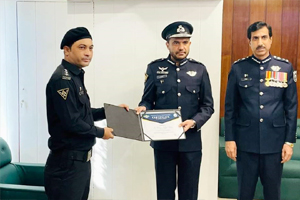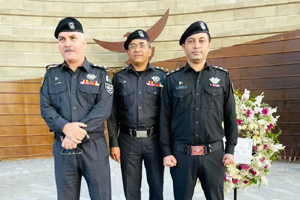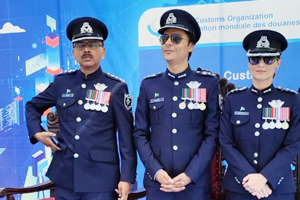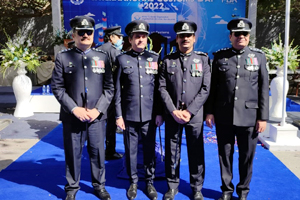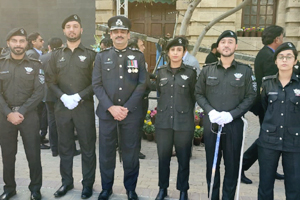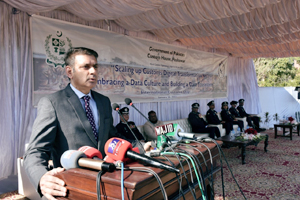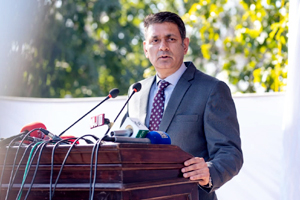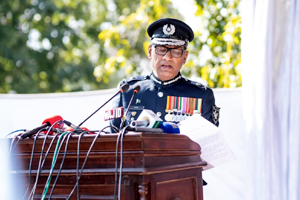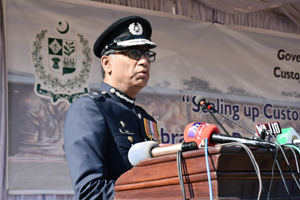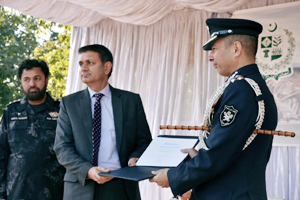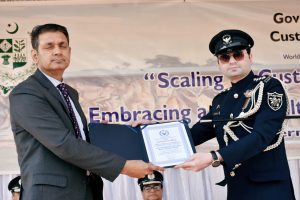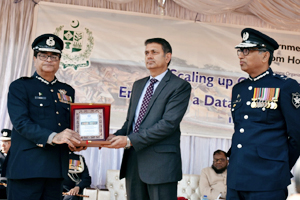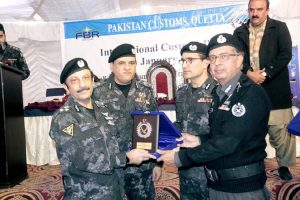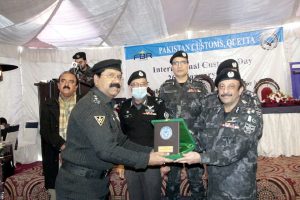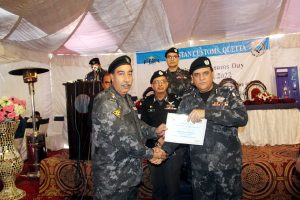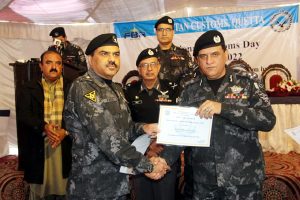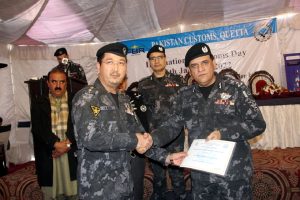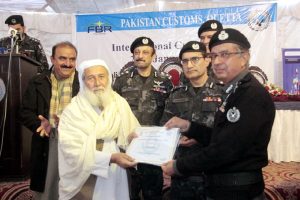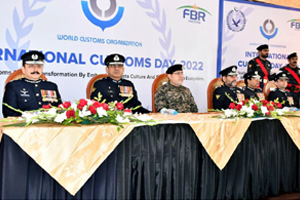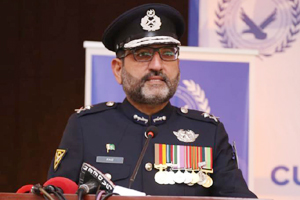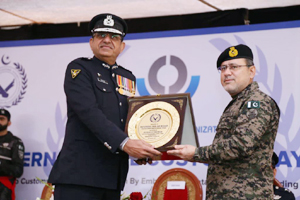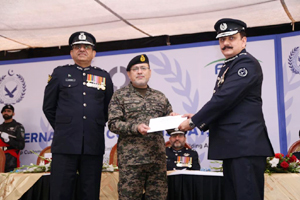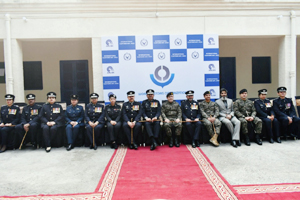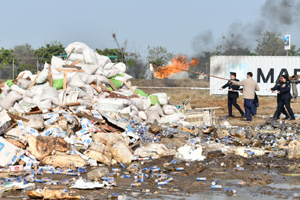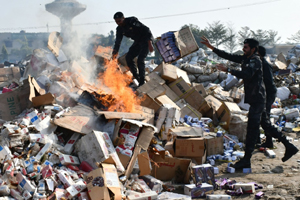Messages

THE PRIME MINISTER OF PAKISTAN ON THE OCCASION OF INTERNATIONAL CUSTOMS DAY
I am pleased to know that International Customs Day 2022 is being commemorated. On this occasion, I felicitate Pakistan Customs on their contribution in trade facilitation, revenue collection and safeguarding the country’s borders against smuggling and illicit trafficking.
Our Government has initiated and is implementing paperless E-system to ensure transparency and collection of authentic data. It is a matter of satisfaction to note that Pakistan Customs has been able to generate useful data regarding trade transactions which is not only being utilized by Federal Board of Revenue (FBR) in revenue analysis and audits but also by many other government organizations for policy making. Besides, the launch of Track and Trace system by FBR will digitise the economy and boost additional revenues.
This year’s International Customs Day theme “Scaling up Customs Digital Transformation by embracing a Data Culture and Building a Data Ecosystem” emphasizes the need for Pakistan Customs to further strengthen and develop data analytics. It will enable the Government to effectively manage and process the trade and seizures data to upgrade Risk Management System for better trade facilitation and strict enforcement.
Our Government achieved record tax collection and it was possible by employing e-filling for ease of tax-payers. Moreover, under the policy of “Ease-of-doing-business”, the Government is facilitating investors through one-window by utilizing online portals. It is, therefore, imperative to adopt digital technologies for the benefit and welfare of people.
I hope that in this financial year Pakistan Customs will keep on performing with greater zeal, utmost professionalism, and integrity in supporting government’s vision of a prosperous Pakistan.

PRESIDENT OF THE ISLAMIC REPUBLIC OF PAKISTAN (ON THE OCCASION OF INTERNATIONAL CUSTOMS DAY ON 26TH JANUARY, 2022)
Pakistan Customs is celebrating International Customs Day on 26th January under the auspices of the World Customs Organization (WCO). I convey my sincere felicitations to Pakistan Customs on this auspicious international occasion.
The government of Pakistan concurs with and supports the theme chosen by World Customs Organization for the year 2022: “Customs Digital Transformation by Embracing a Data Culture and Building a Data Ecosystem”.
Digital transformation is no more an option. It is a reality. We must accept it. It has become imperative for Pakistan Customs, Federal Board of Revenue and business community of the country. Pakistan Customs, being part of the global customs community through World Customs Organization and World Trade Organization, is ready today to embrace a data culture and build a data ecosystem for the digital transformation of its Customs Service.
I am glad to know that Pakistan Customs is an automated organization. If Pakistan Customs can successfully put in place an indigenously developed digital System-Web Based One Customs (WeBOC)-encompassing all types of business processes, it is capable enough to effectively and efficiently undertake another venture as well-Customs Digital Transformation by Embracing a Data Culture and Building a Data Ecosystem.
Inter-dependence and Inter-connection of international trade in this age of increasing globalization requires infrastructural upgradation and capacity building of the Customs Administrations to achieve the object of digital transformation.
It is need of the hour that apart from Information & Intelligence Sharing, Data Sharing and Data Communication system is made more efficient and effective. I am happy to note that Pakistan Customs, Federal Board of Revenue is already deploying and implementing digital trade hub known as Pakistan Single Window.
The system is to automate public sector entities dealing with cross-border trade and will provide an integrated single interface with private sector to carry out imports, exports and transit trade. The government to government and business to government transactions to take place on this platform would enhance efficiency, connectivity and transparency.
Keeping in view the ever-expanding globalization and international trade, I foresee an expanding role of Pakistan Customs. This government expects Pakistan Customs to increase transparency, enhance service delivery, effectively enforce law and collect revenue. I have high hopes attached to Pakistan Customs regarding its professionalism, efficiency, progress and effectiveness. I wish a great and digital future to Pakistan Customs.
Long Live Pakistan.

THE HONORABLE FINANCE MINISTER OF PAKISTAN ON THE OCCASION OF INTERNATIONAL CUSTOMS DAY 2022
On the occasion of International Customs Day, 2022, I felicitate Pakistan Customs on joining the Customs administrations around the globe to celebrate this annual event.
Customs plays a key role in differentiating between legitimate and illicit trade, while putting in place policies and procedures to make the flow of trade as speedy as possible for law-abiding companies. Making Customs processes faster and less cumbersome can boost economic activity, create jobs and stimulate growth.
When Customs processes are complicated, it is the small businesses that lose out the most. Small and medium businesses have the greatest potential to fuel economic growth but they often lack the financial and human resources to comply with complicated border procedures. By making Customs processes transparent and less costly, Customs authorities can grant small business a level playing field, for the benefit of all.
The contribution of Pakistan Customs in anti-smuggling, trade facilitation, and revenue collection has remained outstanding especially in the recent years. Pakistan Customs’ WeBOC system is a completely paperless import, export and transit trade clearance system. Through the digitization of Customs Clearance procedures, Pakistan Customs has created a Big Data warehouse of trade transactions which can be effectively utilized by Federal Board of Revenue to improve its revenue collection and enforcement.
The International Customs Day’s slogan for this year is “scaling up Customs Digital Transformation by Embracing a Data Culture and Building a Data Ecosystem”. It emphasizes the need for development of data analytics and business intelligence skills to effectively utilize the trade and seizures data by Customs for trade facilitation and better enforcement.
Pakistan Single Window is a flag ship project of trade facilitation and digital transformation in line with the slogan of International Customs Day. Pakistan Customs can thus play a key role in government’s efforts to boost the economic activity in the country by upgrading its IT infrastructure to expedite the flow of trade and to reduce the cost of doing business.
By exchange of data with other Customs administration, Pakistan Customs can effectively deal with the challenges of under invoicing and other fraudulent trade practices. Such electronic linkages can also boost the regional trade by providing express clearance facilities at the borders for our exports.
I once again congratulate Pakistan Customs for their excellent work and achievements and wish all the Customs officers continued success in their nation building endeavors.

ON INTERNATIONAL CUSTOMS DAY26th JANUARY 2022
It is a matter of immense pleasure for me to join Pakistan Customs in celebration of the International Customs Day, 2022. The theme of this year’s event “scaling up Customs Digital Transformation by Embracing a Data Culture and Building a Data Ecosystem” marks the resolve of Customs organizations around the world to build and smartly manage Big Data for cross border transactions, regulatory approvals and seizures of contraband goods for better trade facilitation and effective controls.
By adopting latest business intelligence and data analytics tool, Pakistan Customs can process trade data for improving its clearance processes, and exercising better controls against revenue evasion and smuggling. The effective use of cross-border data can also be helpful to broaden the tax base.
Over the years digital technologies have evolved rapidly and Customs can also tap data from open-source platforms and other government agencies to augment its data warehouse. To build a proper data eco system, Pakistan Customs needs to shift completely on paperless clearance and 2022 may be marked for accomplishing this task.
By making use of international data formats such as WCO Data Model. The standardization of data can be ensured for proper data exchange. Thus a robust databank will help Customs to make informed and evidence based decisions.
I would urge upon Pakistan Customs to introduce data sciences in the curriculum of Pakistan Customs Academy to impart latest data analysis techniques to the officers for management of large volume of data collected. The digitization of seizures and enforcement data can help develop a National Targeting System for apprehending evaders and smugglers.
Similarly, the utilization of cross border data linked with other sources can improve the Risk Management System for facilitating the legitimate trade. Pakistan Customs can thus play a key role in enhancing the country’s international and regional trade by smart and coordinated border management through the use of digital technologies.
I take this opportunity to congratulate Pakistan Customs Service on this important occasion and hope that all officers and officials will play their role in the development of the country.

ON INTERNATIONAL CUSTOMS DAY
Pakistan Customs is celebrating the International Customs day in unison with the World Customs Organization under the theme of “scaling up Customs digital transformation by embracing a data culture and building a data ecosystem”.
In principle, this theme indicates the direction Customs Organizations world over should take to enable them to perform the heavy task mandated by their respective countries.
Evidently, technology averse Customs administration would neither be able to support its country’s industry and innovationnor protect it from cyber-attacks on its economy in a highly digitized world. This is therefore a do or die situation and smart nations have been quick to adopt a data culture.
On this account I am very proud to say that Pakistan Customs has already embarked on this journey leading the Pakistan Single Window Project which when completed should be no less than world class. It will totally transform Pakistan’s cross border trade, directly reducing the cost of doing business and linking our industry into the global value chain.
On the enforcement side, data and analytics will enable Pakistan Customs to thwart illicit cross border trade, thereby protecting our society from its harmful effects.
Pakistan Custom’s performance is measured by the revenue it collects, as a department within FBR, yet my Administration remains cognizant of its other significant mandates like trade facilitation, industry protection and trade competitiveness by cutting un-necessary costs.
On all these counts, I am very proud to say that Pakistan Customs has tremendous achievements to showcase during the past year or so.
To steer Pakistan Customs in the right direction, we are replacing our logo and motto of 1975 “Integrity, Efficiency and Courtesy ”with“ Enforce, Facilitate and Progress”, which calls for us to undertake the additional roles of growth and development partners, like rest of the Customs administrations, rather than a mere revenue generating body.
This shift in focus is in line with international best practices and the ever changing role of a dynamic organization. We are proud to have in our ranks dedicated and world class personnel who are ready to take on this mammoth responsibility of supporting Pakistan’s economic and social growth. I wish everyone a great International Customs Day.
COLLECTOR OF CUSTOMS (ENFORCEMENT), PESHAWAR ON THE OCCASION OF INTERNATIONAL CUSTOMS DAY CELEBRATED ON 26TH JANUARY, 2022 AT CUSTOM HOUSE, PESHAWAR
Malik Kamran Ahmad Khan Rajor
International Customs Day is celebrated under the auspices of World Customs Organization on 26th of January every year.
It is an important occasion to express solidarity with the global Customs fraternity and at the same time a day to resolve for future cooperation and collaboration to make international trade safe, secure and beneficial for all actors and nations.
Every year, the World Customs Organization (WCO), keeping in view the emerging trends in international trade, chooses a relevant theme and events are organized around the globe to publicize Customs role and significance with respect to the chosen theme. The WCO has dedicated this year’s Customs Day to the slogan “Scaling up Customs Digital Transformation by Embracing a Data Culture and Building Ecosystem”
Customs administrations around the world are entrusted with myriad of responsibilities including collection of duties and taxes on imports; cargo and passenger clearance; enforcement of multiple laws governing the cross border movement of goods such as health and safety, intellectual property laws, CITES, counter-narcotics regulations, etc.; interdiction of illicit and dangerous goods posing threat to the society apart from the safety and security of international cargo supply chain which is vital for the economic growth and prosperity of every nation.
It is indeed a matter of great pride that Pakistan Customs has made great strides in the last few years to transform the organization into a modern, progressive and vibrant body.
In fact, on this year’s Customs Day, we also pay tribute to our fallen hero, Mr. Farooq Jan (Shaheed), Mr. Farooq Khan (Shaheed) & Mr. Fahad Basir (Shaheed), Sepoies who laid down his life in the line of duty on August 9, 2021 in a cowardly and dastardly attack by unscrupulous smugglers. Despite this huge loss, our spirits are not down and we are ever more re-invigorated to eliminate the menace of smuggling from the society.
Pakistan Customs anti-smuggling outfits have always been on the forefront and seized huge quantities thereof through life threatening operations. In the CFY the Collectorate of Customs (Enforcement), Peshawar had seized Gold worth Rs.25.88 million, Foreign Currency including Pakistani Currency worth Rs.20.59 million, NDP Vehicles worth Rs.209.300 million and other contraband goods including F/o Cigarettes, Arms & Ammunition worth Rs.421.39 million. Furthermore, Gold weighing 20 Kgs & Silver weighing 50.037 Kgs was sent to Pakistan Mint House, Lahore for melting purpose. Moreover, Foreign Currency including Pakistani Currency of Rs.188.09 million was deposited into the government treasury.
In the end, I would like to congratulate my fellow officers, officers from other law enforcement agencies and trade community on the auspicious occasion of International Customs Day. Simultaneously, I would also like my fellow officer to remember our fallen colleagues whose sacrifice has given a new lease of life to the organization.

Karachi Customs Agents Association (KCAA) wishes the Customs community worldwide a cheerful International Customs Day
On the auspicious occasion of International Customs Day being celebrated by Pakistan Customs on 26th January, 2022 along with other Customs Administrations across the world I would like to congratulate all the officials of Pakistan Customs from the profoundness of my heart. This day has been chosen by the WCO as a time to commemorate the valuable role played by customs administrations worldwide in the protection of national borders while ensuring facilitation of legitimate trade. The WCO is dedicating 2022 with theme “Customs Digital Transformation by Embracing a Data Culture and Building a Data Ecosystem” which marks the significance of the global diversification in E-commerce and the challenges being faced by the Customs Community to handle the growth in volume of shipments.
During these difficult times observed after the outbreak of COVId-19 pandemic the said theme also highlights the united efforts of the Custom Community in supporting people and businesses by strengthening the global supply chain, reinforcing collaboration and harnessing technology The pandemic has further reminded us that the path of modernization and trade facilitation is necessary to ensure a safe business environment. In today’s world, the international trade scenario has changed drastically, demanding not only dialogue between international jurisdictions but also sustainable partnerships with the business community..
International Customs Day recognizes the role of custom officials and agencies in maintaining the flow of goods across the world’s borders. On this day, members of the World Customs Organization (WCO) also showcase their efforts and activities that control the flow of goods in and out of the country which can be anything from animals to hazardous materials to personal items. Since Custom Administrations around the world interact with global supply chains therefore, the best practices need to be adopted to ensure smooth implementation of constructive trade activities. We all appreciate that Customs Administrators played a vital role on the front line to ensure trade is safeguarded against all economic terrorism.
Pakistan Customs is one of very few organizations who pioneered in designing and automating their clearance and audit systems in the country. It is known fact that increase in trade volumes cannot be handled without state of the art clearance systems and the department’s efforts in this regard must be appreciated. Introduction and updation of automated environment is indeed a remarkable achievement providing benefit to all stakeholders i.e. the Government, trade and industry.
The Karachi Customs Agents Association is especially grateful to Pakistan Customs for ensuring to fulfill its role even in these difficult times. I once again wish to convey my best wishes to the Pakistan Customs on the International Customs Day.

The world customs community is celebrating International Customs Day on 26th January 2022 across the globe. Pakistan Customs play a pivotal role in economic development through effective targeted controls and the facilitation of legitimate trade. Pakistan Customs is keen on sharing knowledge and adopting best practices within the customs community and this year’s theme of “Customs Digital Transformation by Embracing a Data Culture and Building a Data Ecosystem” creates new responsibilities which cannot be addressed without the necessary skills, knowledge and connectivity.
Global trade requires international cooperation and coordination among governments and trade bodies. Pakistan Customs being an active member of the International Customs family interact with customs organizations of the other countries under the auspices of the World Customs Organization. This interaction helps support the smooth and lawful flow of goods, services, people, technologies, capital, culture and ideas. This connectivity with the international organizations paves way for modernization and economic development of the country.
During this Covid-19 pandemic, Customs demonstrated the relevance of the critical role that it can play in facilitating trade and travel, simplifying, standardizing and harmonizing border procedures, while securing them simultaneously. I can proudly say that Pakistan Customs in this time of need ensured continuous operation of the trade supply chain guaranteeing that all goods including but not limited to food items, medicines, etc. are processed from borders without any delay. At a time when all departments of the country were not fully operational and the country was fighting its battle with the pandemic, Pakistan Customs fulfilled its role well by ensuring smooth delivery of goods with continuous trade facilitation and strengthening of global supply chain.
Pakistan Customs has always remained in the forefront of liberalization through rationalization of the trade regime and procedures by supporting government’s initiatives to facilitate and enhance trade with international partners. The ongoing restructuring of tax initiatives and automation of Customs procedures, in line with international best practices, will go a long way in integrating Pakistan’s economy with the global commerce and harnessing fruits of globalization.
In such an environment, the role of custom agents is highly important in helping the government to achieve an appropriate balance between trade facilitation and regulatory control. We as custom agents are providing service with high professional standards and ethical behavior and we are ready to stand side by side with Pakistan Customs during this digital transformation of trade controls across borders. The Karachi Customs Agents Association is especially grateful to Pakistan Customs in general and WCO in particular for keeping us on their top agenda of training and learning. I wish to convey my best wishes to the Pakistan Customs on the International Customs Day.
Articles
CUSTOMS INTERVENTIONS TO CURB UNDER-INVOICING

The shift in international definition of custom value from the “Brussels Definition of Value (BDV)” to the “Transaction Value” under the World Trade Organization (WTO) Valuation Agreement was a giant leap forward for the Customs Administrations as well as the international trade.
The erstwhile BDV system was based on the normal price which imported goods would fetch in the local market of importing country at or about the time of import. On the contrary, the modern Transaction Value based system defines the customs value as price paid or payable on the actual international transaction.
Pakistan Customs has put in place a comprehensive legal and administrative mechanism to ascertain the actual transaction value of imported goods, which is in line with WTO Valuation Agreement and World Customs Organization (WCO) guidelines. While Section 25 of the Customs Act, 1969 provides for six sequential methods to be followed for determining the custom value in line with WTO Valuation Agreement, another Section 25A of the Act provides for the determination of values of those items which are prone to under invoicing through a valuation ruling after detailed price investigation from local market and the country of origin.
Under invoicing not only compromise the legitimate government revenue but also hurt the local industry. The consistent efforts of Pakistan Customs has curbed under invoicing to a great extent in the country.
A specialized Directorate General of Custom Valuation issues Valuation Rulings (VRs) for all such susceptible items which are prone to under-invoicing. At present, almost 80% of the under-invoicing prone imports are covered by these VRs, which are regularly updated and expanded. In remaining 20%, items like Tea, Plastics (where international Scan Prices are available), Iron and steel products (London Metal Exchange prices), Edible oils (having international pricing mechanism) and Vehicles up to 1800 CC arc cleared using these sources.
At the clearance stage, an elaborate mechanism to curb under-invoicing is available in WeBOC System in the form of ninety (90) days data which is legally covered under rule 107 of Customs Rules, 2001 and is fully consistent with Article 2 of the WTO Valuation Agreement.
17% of the total annual import value of Pakistan are subjected to application of VRs whereas 83% of the total import value are finalized by the clearance Collectorates in terms of Section 25 of the Act by applying 90 days clearance data of identical or similar goods or acceptance of declared value as transaction value.
This mechanism provides a great balance towards trade facilitation and valuation checks. Out of total duty and taxes collected at import stage annually, 25% come in cases where assessment is finalized on basis of VRs. In Finance Act, 2021, law has been amended to consider authentic and reputed international references valid for the purposes of valuation.
The accredited international publications like Reuters (Palm fatty acids), Independent Commodity Intelligence Services (ICIS), London Metal Exchange (LME) etc are also being referred to for correct valuation. Accredited Publications are being subscribed to be used as benchmark values for the Collectorates and also hedging of more VRs.
The VR regime had been expanded to cover imports worth Rs. 1,549 Billion. In addition certain statutory changes like increase in pitch of fine on missing invoices from containers, use of internationally accredited publication as bench mark values etc has been implemented. The department remains vigilant vis-à-vis imports exhibiting wide / abnormal variations in the declared values and this led to import value of Rs. 270 billion being brought within the ambit of VR regime during first half of CFY, while a focused plan is being pursued to cover the remaining value during second half of CFY.
In view of the increase in international sea freight charges, Pakistan Customs has initiated an exercise of reviewing the VRs keeping in view element of freight along with the fluctuations in the international prices of the goods. VRs have also been identified for re-issuance, which are outdated and require revision of the notified Custom Values. Apart from the above exercise, all Clearance Collectorates have been sensitized to factor in the enhanced freight element, where necessary, while assessing the imported goods.
This aspect of increase freight is also visible in the WeBOC transaction data wherein, over last six months (July-December, 2021) of the CFY, Rs. 21.2 billion freight has been declared/assessed as against Rs.7.8 billion freight during the corresponding period of Previous Financial Year (PFY) reflecting a growth of 172% in freight element.
Pakistan Customs has also made very advance technological interventions to curb under invoicing including the business process related automation of I-Form and E-Form on WeBOC in cooperation with SBP, optimization of the WeBOC Risk Management System to focus on value deviations, cognizance of the globally enhanced freight element and implementation of Electronic Data Interchange (EDI) with China.
During the Current Financial Year (CFY) structured description based deployment of VRs in WeBOC has been effected to strengthen valuation compliance. Furthermore, a plan is under implementation to make use of Artificial Intelligence (AI) based cleansing of valuation database to improve quality of 90-day clearance data along with implementing a Natural Language Processing (NLP) based algorithm that uses text mining, Machine Learning (ML) & AI-based tools including Web-Crawling System (WCS).
Pakistan has also initiated establishment of Electronic Data Interchange (EDI) agreements with relevant trading partners of Pakistan (i.e. China; UAE; Hong Kong; Singapore; and Afghanistan in conformity with the Transitional Standard 6.9 of Chapter 6 (i.e. Customs Control) of Revised Kyoto Convention (RKC) published by WCO. The Customs shall use information technology and electronic commerce to the greatest possible extent to enhance Customs control.
These electronic data exchanges will be of great help to weed out the bane of under invoicing.
Owing to these persistent multi prong legal, administrative and technological interventions of Pakistan Customs, the under invoicing in Pakistan is on continuous decline. The positive impact of Valuation Controls measures taken by Pakistan Customs to counter under-invoicing is reflected through the mirror-analysis of the past five year data of Chinese exports to Pakistan and conversely Pakistan’s imports from China (ITC Trade Map http://www.trademap.org/index.aspx) has revealed a reduction in the reported trade gap from 35% to 9% with respect to Pak-China trade.
PAKISTAN A FORERUNNER IN ABIDING BY THE INTELLECTUAL PROPERTY OBLIGATIONS

The International Customs Day is celebrated every year on January 26th. Being a signatory of WCO, Pakistan Customs along with its field formations, is also celebrating international Customs Day on 26th January 2022. The slogan of the day is “Customs digital transformation by enhancing a data culture and building a data ecosystem”.
The theme highlights our efforts of automation and digitalization of its system so as to ensure smooth and timely clearances of all import and export consignments. Its ISO Certified WeBOC system has integrated all the local stakeholders for seamless and speedy clearance of the consignment and smooth flow of trade across borders.
The pilot project of its new and improved Pakistan Single Window Project has taken a major step in digital transformation and is in the process of integration with not only the local but all the regional stake holders including banks, transporter courier services, bonded carriers etc.
As far as Directorate of IPRE is concerned, we have automated Custom recordals of National and International Brands. Under TRIPPS AGREEMENT we are bound to protect the rights of all National and Internationally registered brands. This is made possible only through the digitalized system.
As per complaints/Enforcement applications received under SRO170(I)/2017 against counterfeit consignments or infringed items; consignments are detained in the system and alerts generated all over Pakistan. Our work is based on risk analysis and has been made possible by enhancing a data culture and building a data ecosystem.
The Directorate General of Intellectual Property Rights, upon its inception in 2014, was tasked among other things, with developing computer based risk assessment system and targeting tools compiling data with IPR violation and build a database with all the right holders of national and international brands.
Keeping this in mind, the Directorate General of IPRE, and the regional Directorates, under the able to leadership of Director General, Madam Rubab Sikander, undertook steps towards digitalization and building a sustainable data ecosystem. They have been successful in maintaining an anti-counterfeiting department that operates as a single-stop for International and National Right-holders to seek remedies against the Infringement of their intellectual property rights in Import and Exports, thereby safeguarding the legitimate government Revenue, promoting importers of genuine goods, ensuring the health and safety of the consumers, as well as improving Pakistan Custom’s image in the International Community.
Today, the Directorate of IPRE South has a robust targeting mechanism in which after receipt of an enforcement application, or a case referred from any Clearance Collectorate, the credentials of the right holders are verified through the Recordation Data Base on Intellectual Property Organization (IPO), Pakistan. Once the available database verifies the claim of a right holder, the consignment of alleged infringing goods are detained and dealt with according to law.
In this regard, the Directorate of IPRE(S), Karachi has maintained a local data base of all the consignments intercepted, the seizures and forfeitures made thereafter and litigations pending against these seizures. Besides, the Directorate of IPRE(S), has also taken a lead role in maintain a recordation database of various products, trademarks, copyrights etc of different right holders, having frequent imports, so that swift action can be taken in case of IPR violation.
Multiple cases carrying miscellaneous counterfeit goods worth a market value of more than Rs.700 million, have been detected by Directorate of IPR Enforcement, and a record number of forfeitures made, which will be destroyed during the upcoming International Customs Day.
The first and foremost priority being consumer health and safety, most of these seizures are of counterfeit consumer items including empty bottle/tube/aerosol cans to be used for sale of counterfeit cosmetics, perfumes, tooth-paste, toiletries, insecticides and all products meant for infants.
Historic cases of counterfeit Swiss and Japanese watches, containers full of counterfeit mobile batteries, and adhesive stickers of International brands to fool the common man into buying very cheap quality mobile and computer accessories, chargers, hand free, wifi-routers, power banks etc mistaking them as branded products of Apple, Huawei, Xiomi and Samsung, Tons of counterfeit packing material of all renowned brands like, Adidas, Channel, YSL, LV, Dior etc as well as their products.
The next concern is the Automobile parts, where bringing fake/infringed copies again means playing with lives of Passengers and driver; such as the counterfeit Auto Air bag cover, which have caused hundreds of fatal car accidents in Pakistan Most interesting was the Directorate’s successful attempts in foiling/un-earthing black- mailers who ruin the business of genuine exporters and ruin Pakistan’s image abroad.
The rice Association, were full of appreciation for Directorate of IPRE South. In a short time, Directorate General of IPRE and Directorate of IPRE South has earned the respect of numerous International brands and IPRE received letter of appreciation from several, including GSK, Proctor and Gamble, Unilever, Zong, LG, Toyota, Samsung, M/s B.P.S and M/s OSIRIS and received Appreciation letters and Shield from them.
Multiple training and awareness seminars were held. In addition to Awareness Seminars arranged for MCC Appraisement Quetta, Directorate of Intelligence and Investigation Quetta and Directorates in Karachi, presentations, awareness seminars and visit to the counterfeit gallery were arranged for various batches of probationers during their STP; as well as specific ones for the chamber of commerce from all over Pakistan via zoom and FPCCI, Special sessions for FPCCI Karachi, and their women entrepreneurs; and even with CEOs of all Multi-National.
Brands through overseas Chamber of Commerce Karachi. During the current year the young Probationary officers of 47 th and 48 th CTP were trained by the Directorate in enforcement of IPR laws. In a similar collaboration between the Overseas Chamber of Commerce and Directorate of IPRE South in February 2021, another awareness seminar was conducted for controlling the trade of counterfeit Pharmaceutical products which was attended by the representatives of companies like Novartis, Abbott, Pfizer, Bayer Wyeth Pakistan. An IPR awareness seminar was conducted for the member of FPCCI which was virtually joined by the member of all the Chambers of Commerce across country.
As well as eight months long Zoom Awareness Seminar of 85 Customs Officers of Grade 17 and above pharmaceutical industry of Pakistan FDA USPTO etc.
External outreach interactive sessions were arranged, over the year in collaboration, with at least 150 International brands like Siemens, Samsung, Uniliver, P&G, Toyota, etc. Custom Recordals of 200 plus brands maintained and the number is increasing on daily basis. The Directorate General of IPRE South is striving to bring maximum digitalization and automation in its systems. During this era of Covid, hitting the economy of the entire world.
IPR is connected with the rest of the world through zoom meetings and seminars and is trying to make Pakistan a forerunner in abiding by the Intellectual Property obligations and making it a favorite trading hub for International brands.
The Directorate is ensuring that the staff of Pakistan Customs and all other stakeholders are well aware of their responsibilities regarding IPR along with ensuring the health and safety of the citizens by discouraging the trade of counterfeit products.
PAKISTAN CUSTOMS NATIONAL TARGETING CENTRE (NTC) A NATIONAL SINGLE WINDOW FOR ENFORCEMENT FOR ALL LEAs

Customs administrations throughout the world have undergone tremendous reforms to match the changing demands of international trade as well as the emerging trends in the international security paradigm.
This re-defined domain is more focused on implementation of trade policies, money-laundering, immigration and border management, counter-terrorism, anti-intellectual property piracy, anti-smuggling operations including human and drugs trafficking, cyber-crimes, safeguarding public health and morality and a myriad of other issues.
Such engagements bring along the wealth of multi-stream data that can ultimately lead to digital transformation by embracing a data culture and building a data ecosystem.
Therefore, most of the developed countries are now embarking upon Coordinated Border Management (CBM) through a single agency at the national entry/exit points. The concept of a “single face at border” is used to facilitate bonafide passengers and cargo while interdicting only the risky ones which essentially forms the basis of a National Targeting Centre (NTC).
NTC concept is based on linking all the available data streams and to provides a single platform for multiple law enforcement agencies (LEAs) for identifying and profiling of any suspicious passenger, baggage, cargo or conveyance based on an “Integrated Risk Management System”. The basic functional model consist of data sources, operational modules, core NTC analytics module and inter-agency linkages. The operational support is provided using risk related information exchange and subsequent tactical analysis through stakeholders cooperation and coordination.
Most of the developed Customs Administrations adopt a monolithic approach to raise an NTC from the scratch due to their extensive financial and technological resources and they can build multiple modules from a single platform. However, developing countries like Pakistan have to Syed Asad Raza Rizvi Collector of Customs- Exports, Karachi/ Project Director- National Targeting Centre adopt an integrated approach while linking data provided by many off-the-shelf and easily available information systems and then integrating the information using a collating platform.
In order to cater for the above objectives, establishment of Pakistan Customs National Targeting Centre (NTC) has been envisaged as a National Single Window for Enforcement for all LEAs under the lead of Pakistan Customs and in line with International best practices. The NTC will have a Central Command and Control Centre at Islamabad and will be linked to various field targeting teams embedded in different field formations.
Information on specific roles of different LEAs will be shared on real-time online basis in order to ensure a complete 360 degree coverage. Besides trend analysis, the system will be capable of generating alerts to all teams operating at different entry/ exit points to ensure a quick interdictions.
NTC at the later stage will also be linked to the Pakistan Single Window (PSW) to provide the necessary trade related linkages. In wake of our weak financial resources, restricted technical expertise and with limited time at hand, an integrated approach has been used, being an easy and doable solution.
For this purpose all the available resources available with the International Organziations and development partners are being explored. At present, Pakistan Customs has already identified the basic data modules for NTC. A few have been developed and deployed in-house such as the Currency Declaration System (CDS) and Customs Interdiction Module (CIM) relating to foreign currency declarations and anti-smuggling seziures respectively.
Additionally, the World Customs Organization (WCO) has provided some of its modules free of cost for the NTC such as; the modules pertaining to Advance Passenger Information System (Global Travelers Assessment System – GTAS) as well as Customs Seizure database (WCO National Customs Enforcement Network-nCEN) have already been deployed through funding from US Customs and UK HMRC respectively.
Deployment of another module for cargo profiling (WCO Cargo Targeting System –CTS) is underway with the funding from UK Border Force. It is hoped that once these basic modules are fully deployed and operational, the central collating platform will be developed to initiate alert generation and trend analysis hence making the NTC fully operational.
CUSTOMS APPRAISEMENT PESHAWAR SPEARHEADS CAMPAIGN AGAINST NARCOTICS SMUGGLING
Customs Appraisement Peshawar is primarily responsible for handling bilateral trade cargo cleared from border Customs Stations falling in its jurisdiction.
In addition to assigned responsibilities, the staff deployed at border stations remained vigilant against movement of contraband items like narcotics etc.
Let by Collector Amjad ur Rhman, MCC Peshawar is at the forefront of the campaign against smuggling, under-invoicing and mis-declaration.
The losses caused by smuggling and under-invoicing may run into billions of dollars. MCC Peshawar’s team comprising Additional Collectors Shahid Jan, Dr Wajid Ali, Muhammad Tayyab, Deputy Collectors Umair, Amanat khan, Ms Saiqa, Assistant Collectors Saifullah and Gul Said have made significant gains in terms of revenue collection as well combating smuggling of narcotics.
Customs staff at Torkham during last few days intercepted six consignments of narcotics being transported in the concealed cavities of vehicles coming from Afghanistan. The seized narcotics including heroin, methamphetamine, opium, hashish weighing a total of 1,090.5 Kgs are worth Rs3.14 billion.
All these seizures of narcotics are unique in terms of quantity and the officers and staff have shown exemplary performance.
These cases got matured due to diligence of officers and staff deployed at Customs Station Torkham. Furthermore, 06 FIRs have been lodged against five accused persons, whom were arrested on the spot. Investigations are underway.
MCC Peshawar Appraisement has surpassed the revenue target, i.e. first half of the FY2021-22 ended December 31, 2021 by realizing duty/taxes Rs25.6 billion as compared to same period last year’s collection of Rs15.8 billion, by a surplus of 61 per cent than the last year.
COMPLIANCE RISK MANAGEMENT SYSTEM (CRMS) TRANSFORMING TRADE FACILITATION AND CUSTOMS CONTROLS
Sanaullah Abro
Director, Directorate General of Risk management System (RMS)
Without digital transformation, Customs administration cannot be modernized in 21st century. And Customs Risk Management System (RMS) is always at the core of any digitally transformed modern customs processes.
The Customs RMS technically termed as Compliance Risk Management System (CRMS) is the central and a critical function of Customs clearance system in any country of the world. It is the tool which Customs administrations all over the world are relying upon to strike a most difficult balance between trade facilitation and Customs controls.
The CRMS reduces the cost of doing business, eradicates human intervention in clearance of goods, and eliminates delays in clearance process and put to an end to red tapism and corrupt practices from Customs processes of trading across borders. In addition, it brings, transparency and efficiency but keeps unpredictability in selection of consignments for inspections and documentary checks to promote compliance.
Pakistan Customs has successfully achieved the digital transformation of Customs’ core processes of trading across borders including import, export, transit and transshipment. The recent phase of digital modernization started in 2004-5 with development and introduction of Pakistan Computerized Clearance System (PaCCS) which first time introduced the Risk Management System (RMS) in Customs clearance system.
It was major shift for change management in Customs administration. After its shocks and maturity, Pakistan Customs was able to develop its own customs clearance system known as the Web Based One Customs (WeBOC) with indigenous resources in 2011. Since then, the WeBOC has been scaled up in terms its scope, functions and modules ranking it as one of the modern efficient customs clearance system.
The untiring efforts of customs officers and PRAL technical team and its software engineers have successfully brought the digital transformation as per needs of the businesses. The Risk Management System has the central role for customs clearance system for imports, exports, and transit which decide and select the suspected consignments for physical inspections and allows the rest to be cleared through fast track green channel.
There is no human intervention in selectivity of consignments by the RMS. Its decision is purely data driven, based on the risk profiling system of traders and goods crossing borders and the regulatory requirements of country. Hundreds of frisk actors, flexible and inflexible risk rules are accounted for by the RMS software for its decision making to identify the risky and no risky consignments to be checked and not to be checked by Customs. 66% percent of import export cargo throughput has been cleared with in few hours by Customs by checking its compliance level by use of CRM.
The CRM has helped to improve Pakistan’s ranking in Ease of Doing Business from 171 in 2016 to 111 in 2020. It has directly saved the cost of USD 50 million annually incurred on physical inspection of goods. The RMS has also been refined with passage of time by self- learning, with assistance of donor agencies and by adding technological modern tools and support systems.
The important addition to RMS system was the introduction of Artificial Intelligence (AI) and Machine learning (ML) technology. The tools were developed with World Bank experts. The important tool is known as Predictive Analytics (PA). The PA tool captures the pattern, behaviors and non-compliance trends in Goods Declarations processed in last five years through Machine learning and using the Artificial Intelligence techniques predicts the possible behavior of the declarations made to customs.
The whole process in machine based. And by implementation of latest iteration of ML / AI tool in 2019, the hit rate and detections made has increased up to 87 percent reflecting the effectiveness of RMS system. The latest efforts are made with help of Pakistan Single Window and international donors (ReMITT) to bring the capability of text mining and Natural Language Processing (NLP) to apply on the huge textual data available to customs in form of Goods Declaration for control of under invoicing, correct assessment and better targeting the fiscal frauds. This is the way forward to utilize technological tools for economic development of country.
These skills will also be instrumental in developing the risk rules / criteria for embedding in other Customs tools acquired from the WCO such as Global Travel Assessment System (GTAS) for targeting suspected passengers and their baggage and Cargo Targeting System (CTS) for identifying suspected consignments. At later stage, the NLP skills can also be utilized to the National Targeting System (NTC) which is undergoing through development phases.
It was not possible for Pakistan Customs to handle ever increasing import export cargoes without application of CRMS. It enabled Customs for efficient and quick decision making for clearance of consignments which saved time and money of businesses. It also helped in reduction of port congestions otherwise ports would have been choked with containers waiting for days under manual clearances. It has tremendously supported economic growth and Ease of Doing Business.
The CRM has been implemented across Pakistan and it covers all types of air, land and seaborne cargos cleared through Customs Computerized Management system.It is pertinent to mention that implementation of an effective CRM regime by Pakistan Customs has contributed towards improvement of Pakistan’s global ranking under World Banks’ Ease of Doing Business Survey from 171 in the year 2016 to 111 in 2020, under trading across border indicator.
The CRM efficiency can be seen from the figures that during last five months total of 430,642 TEUs which is 66 % of total throughput (import and export) have been cleared with in few hours after checking the compliance level of traders’ declarations, goods and profiles of the importers/ exporters without any human intervention thereby reducing cost and time of clearance while improving efficiency of port operations.
The direct annual savings of USD 50 million are estimated for the traders/economic operators on account of implementation of Customs Compliance Risk Management system.
CUSTOMS POST CLEARANCE AUDIT
Ms. Ayesha Niaz Director PCA
As we celebrate International Customs Day 2022, a day dedicated to the theme of “Scaling up Custom Digital Transformation by Embracing a Data Culture and Building a Data Ecosystem”, we see how increased automation and digitization in Customs has significantly enhanced the role of Post Clearance Audit (PCA) in Customs enforcement and facilitation.
The launch of WeBOC has allowed for a paradigm shift in Customs clearance across Pakistan. With enhanced green channel clearance, Customs aim to move from strict port controls to more targeted border inspections along with enhanced post clearance verifications, to reduce the time and cost of doing business in line with international best practice.
The World Customs Organization (WCO) strongly recommends a transition from border-based controls to PCA as a primary enforcement tool for Customs, to ensure the smooth hand timely clearance of goods and undisrupted global supply chains.
The post clearance audit approach is essentially a risk-based approach allowing Customs administrations to concentrate their limit resources more effectively and to partner with the business community to improve compliance and facilitate trade. The post clearance audit mechanism cannot, however, operate in isolation – it works only when simplified clearance procedures are instituted at the borders and a dynamic risk management system is in place, capable both of informing and of being informed by PCA.
WCO defines the post clearance audit process as a post-release structured examination of the concerned commercial data, sales contracts, financial and non-financial records, physical stock etc. of traders aimed at both measuring and improving compliance.
The Directorate General of Post Clearance Audit-Customs, Pakistan was established in 2009 in compliance of the recommendations of WCO’s Revised Kyoto Convention and WTO’s Trade Facilitation Agreement (WTO TFA), Pakistan being a signatory to both agreements. The origination’s functions include verifying trade-related declarations to detect discrepancies recover revenue and create deterrence; facilitating compliant trade and developing mechanisms to encourage trader compliance.
Currently, the organization operates with a Directorate General Secretariat at Karachi and three independent Regional Directorates at Karachi, Lahore and Islamabad, covering the Southern, Central and Northern regions of Pakistan respectively. Its purview, as defined by SRO 1114(I)/2019, extends to all imports into the exports from the country.
Over the years, the Directorate General of Post Clearance Audit has striven hard to progressively enhanced its capacity through greater automation, especially with the launch of the PCA WeBOC modules and the increased use of information technology for a targeted, strategic and efficient compliance program.
The organization conducts Transaction Based Audits (TBAs), Entity Based Audits (EBAs) and Sector Based Audits (SBA). PCA requires a strong data culture and relies heavily on data management, data analysis, and its effective usage for planning strategy and operations. For an effective PCA, the use of trader profiling, trend analyses, enhanced risk management, and a robust importer registration program is of paramount importance for targeted action and review.
Globally, in countries like New Zealand, Japan, Korea and Canada, where effective PCA mechanisms have been in place for many years, the focus is more on-site entity-based audits rather than transaction-based audits as it is in developing countries like Bangladesh and Pakistan. Also, these countries boast in integrated and highly dynamic risk management system that plays an important role in the selection and targeting of audits – something stills to be fully implemented in both Pakistan and Bangladesh.
PCA involves verification of Customs declarations through the examination of documentation maintained by traders or their agents once goods have been released from Customs control. A major challenge in the post-clearance audit process is to accurately measures the effectiveness of the audit program and the compliance level or compliance health of trade.
There are significant compliance challenges, lack of documentation is an issue in all developing economies due to a large informal sector. Third parties located in foreign jurisdictions may not cooperate with auditors, and variations in the way different regions conduct audits/verifications may result in confusing and inconsistent decisions for traders.
The Federal Board of Revenue (FBR) and the World Bank have agreed on a series of modernization initiatives focusing on revenue and trade facilitation through increased automation and business process improvements. As part of this reform, PCA is also looking to enhance its inherent capacities by strengthening and integrating the existing Risk Management system in a way that PCA’s feedback renders it both dynamic and relevant.
PCA also intends to fully automate its functions and data management systems and to actively work towards a better trained and well-equipped workforce, in line with WCO guidelines and international best practices, this organization aims at ensuring that while its enforcement function concentrates on issues like money laundering, fraud and criminality, its facilitation function identifies compliant trades to facilitate economic growth and to lay a sound foundation for the Authorized Economic Operator (AEO) Programme in Pakistan (a WTO TFA requirement).
In spite of impediments, PCA has kept pace with the audit benchmarks outlined in the Audit Policy circulated in 2021. PCA Directorates, despite human resource constraints and other limitations, have contributed positively by making detections in the areas of misdeclaration of value/description/origin, misuse of concessions and inadmissible benefits etc.
This has helped in improving enforcement and also making trade more compliant to stipulated laws and rules. However, with the afore-mentioned reforms to strengthen the digital footprint by shifting to fully automated audit systems, PCA Pakistan stands poised to achieve its full potential through enhanced and effective automation, training and intelligent data management and analysis. PCA shall then be able to better deliver on a dynamic Customs compliance and control mechanism as envisaged by the WCO.
TRADE INFORMATION PORTAL OF PAKISTAN
Umair Mahmood Siddiqui
Project Lead TIPP-PSWC
A number of countries have introduced or are considering the introduction of a trade information portal as a means of facilitating trade and increasing transparency.
For World Trade Organization (WTO) members or countries in the process of acceding to the WTO, a Trade Information Portal (TIP) will assist in complying with new commitments currently being negotiated as part of the Doha Development Round.
The negotiations aim to strengthen the provisions of Article X of General Agreement on Tariffs and Trade (GATT) which currently requires that all regulatory trade related information “shall be published promptly in such a manner as to enable governments and traders to become acquainted with them”.
In many developing nations, government agency specific websites may not exist and even when they do they are often incomplete, out of date, or the content may not cover the entire spectrum of information that a trader may wish to obtain to ensure compliance with import, export, or transit requirements.
It is therefore desirable to create a single platform where all the information relating to trade from all the various agencies is aggregated under one roof and is readily available for searching and viewing. However, despite much effort and, in some cases, inter-governmental agreements, many countries still lack an effective and sustainable Trade Information Portal. Many fail to take the user’s viewpoint and do not provide practical step-by-step guides, nor answer key questions relevant to traders. Some have limited or outdated content and are difficult to use and navigate.
Often established in developing countries as part of a project funded by international development partners, their quality will often slip after the project ends.
What is TIPP?
The Trade Information Portal of Pakistan (TIPP) is a website that displays latest and complete regulatory information related to imports, exports and transit trade for any item/HS code as well as useful statistical data for international trade.
The ongoing COVID-19 pandemic is an excellent opportunity for TIPP to demonstrate their usefulness to traders in providing timely information on quickly changing rules and procedures, in particular those relating to the trade of emergency goods and services. Trade Information Portals deliver a range of benefits. It enhances transparency and access to a wide array of information which can be pivotal in making decisions related to trade and investments.
Under Article X of General Agreement on Tariff and Trade (GATT) Commitment to Transparency Pakistan had to establish Trade Information Portal. Later on under Article 1.2 of WTO Trade Facilitation Agreement (TFA) Pakistan had committed to implement the TIPP by 31 March 2022.
Each piece of information made available in TIPP has been collected and validated from the 77 Other Government Agencies (OGAs) as listed in Schedule-I of PSW Act 2021. The regulatory content has been digitized and connected with Pakistan Customs Tariff (HS Codes) creating thousands of linkages to Legal Documents (all relevant laws, rules, regulations and orders etc), Procedures, Measures, Commodities, Forms, Fee Schedules, etc.
As such the OGAs, Economic Operators, investors and academia can freely access useful information on a single click.
Background of TIP in Pakistan:
Attempts made in the past to develop a trade information portal in Pakistan did not yield result. Since PSW as part of its system development effort had already done bulk of the work for TIPP under its Integrated Tariff Management System (ITMS) hence it was decided to help the government in meeting its international commitment.
With support from USAID international experts were hired in April, 2021 and the TIP related tool kit was obtained from World Bank free of cost. Since then all the 77 OGAs as well as stakeholders from private sector have been engaged by a dedicated team of PSW to undertake the task of content collection, validation and uploading.
TIPP Maintenance Mechanism:
Pakistan Single Window Company has placed a robust governance model for the maintenance, management, and support of TIPP. This TIPP Management Team (TMT) housed in PSW HQs is charged with maintaining and updating the portal, liaising with OGAs, and informing and advising Governing Council of PSWC on the management of TIPP.
Collaboration among all stakeholders is being ensured through the principles and commitments set out in the MoU to be signed before launch in March, 2022.
Additional Features beyond Fulfillment of TFA commitment:
TIPP has been designed from the perspective of traders, Overseas Pakistanis, and potential investors who will get the latest and authentic information. TIPP will also provide latest trade statistics, trade agreements and offer list available to Pakistani exporters in international markets for preferential market access.
TIPP will enable them to make informed decisions while undertaking cross-border trade transactions without needing middle-men. Furthermore, TIPP offers guided journeys for visitors through its user-friendly interface available both in English and Urdu in order to attract maximum number of visitors and investors.
Communication and Stakeholder Engagement:
The PSW has engaged all public and private sector stakeholders since the inception of the TIPP project. Multiple awareness/engagement webinars and seminars have been arranged during the project life cycle. Two national level workshops have been held in Karachi and Islamabad. As part of its outreach plan the TIPP Project team is undertaking an extensive road show to visit all leading Chambers of Commerce and Trade bodies across the country before formal launch of TIPP.
THE INTEGRATED TRANSIT TRADE MANAGEMENT SYSTEM- A PROJECT OF PAKISTAN CUSTOMS UNDER CAREC- RIBS PROGRAM
Muhammad Ali Raza (Project Director)
The Government of Pakistan is currently implementing the Integrated Transit Trade Management System (ITTMS) at three Border Crossing Points (BCPs) of Torkham, Chaman and Wahga under the CAREC- RIBS Program funded by Asian Development Bank with Customs Wing, FBR, as the Lead Executing Agency.
The Project aims at realizing the Government of Pakistan’s vision of becoming a transit hub through effective regional connectivity and enhanced trade facilitation to trigger economic growth, achieve poverty reduction and reinforce geo-economics by connecting CAREC region with the sea as well as to the South-East Asian economies.
The Project therefore focuses on modernizing the infrastructure of the said Customs Border Terminals and providing quality value-added services to reduce cross-border processing time for cargo and passengers, and also to improve the skill-base of BCP operating agencies.
The facilities include multi-agency administration and accommodation buildings for 24/7 Operationalization, well equipped Import and Export Customs Control Zones (CCZs) and passenger terminals, installation of Gantry, Pass-Through, and Dual View Inspection scanning equipment, cargo surveillance systems and e-Gates for passenger facilitation etc.
The Project will also incorporate multi-modal road and rail facilities at Chaman and Torkham for cross-border CAREC connectivity for cost-effective and environment-friendly long-distance multi- modal freight movement. E-Gates for passenger facilitation is another hall-mark of this Project. Establishment of Pakistan Land Port Authority (PLPA) under the ITTMS project intends to significantly improve port governance.
The ITTMS Project will lead to enhanced Trade Facilitation through least or no human interface/interruption between entry or exit points, integration of WeBOC with Pakistan Single Window (PSW) Portal for real-time data sharing with concerned stakeholders; Electronic Data Interchange (EDI) with regional economies & trading partners; digitized Non-Intrusive Scanning & Entry & Exit of cargo traffic in compliance with CSI, C-TPAT, TIR & AEO Cargo Security regimes for secure supply Chain; digital end-to-end tracking of containerized cargo on the whole supply chain through Geo-Fencing; reduction in Cost of Doing Business through speedy electronic verification of docs, clearance, weighing, scanning, and evaluation of transit goods for expedited cross-border cargo movement under WTO’s trade Facilitation Agreement (TFA); generation of Computerized e-Transit Reports (ETRs), conveyed to the exit point through integrated high-speed data links for the purpose of clearance in cooperation with all border enforcement agencies; digitized passengers profiling for cross-border movement; professional capacity building of Border Trade facilitation Agencies; and Socio-Economic Development generation for the local population for poverty reduction and skill development.
The Project will have the potential to open avenues for bilateral and regional industrial and investment cooperation under the proposed Cross Border Special Economic Zones at Torkham and Chaman. Such an initiative would be immensely beneficial for both Pakistan and Afghanistan as it can trigger the much-needed industrialization and resultant job creation for Afghanistan and bordering areas of Pakistan.
The Border Crossing Points of Chaman and Torkham developed under FBR’s ITTMS Project (CAREC Corridor-5) therefore offer tremendous opportunity of setting up of Export Processing Zones in their vicinity for the Pakistani companies to manufacture export-oriented goods for Afghanistan, thereby benefitting both countries in terms of employment and revenue generation.
The CAREC Transport & Trade Facilitation Strategy (TTFS) 2020 aims at increasing Port Efficiency and Competitiveness at the Corridors connecting the Country by developing physical infrastructure and logistics suprastructure through modern and fully equipped Customs Terminals.
The Strategy also aims to reduce cost of doing business by improving quality of logistics services and increasing the level of connectivity of the six CAREC Corridors with Pakistan’s seaports to serve as gateways providing access to the global markets.
PAKISTAN CUSTOMS ROAD TO DIGITALIZATION: ACHIEVEMENTS & CHALLENGES
Dr. Muhammad Nadeem Memon
Collector of Customs (Appeals), Karachi
In the past Bill of Entry was a famous document among importers and clearing agents for filing of declaration before Customs and getting goods cleared for home consumption and other purposes.
It had seven copies and each one of these had to pass through approximately 22 desks and was to be signed and stamped by approximately same number of officials/officers.
In 2005 when Pakistan Customs being most dynamic, efficient and vibrant among other government organizations while foreseeing the future boldly embraced the change and started its own re-organization and re-orientation by introducing the computerization and digitalization in customs processes to meet up the challenges of free trade in the modern global village. The Goods Declaration replaced Bill of entry,22 desks and signatories were replaced with digital end to end solution initially by Pakistan Customs Computerized System (PaCCS) and later by Web Based One Customs (WeBoc) operating 24/7.
Heaps of papers in Custom Houses were replaced with neat & clean paper fewer environments with dwell time reduced manifold. In the above backdrop Pakistan Customs together with global customs fraternity are proudly celebrating the World Customs day 2022 under World Customs Organization theme for the year “Scaling up Customs Digital Transformation by embracing a Data Culture and Building a Data Ecosystem”.
In modern times the importance of data culture needs to viewed seriously and adopted by every organization especially in the government because the most compelling benefit of becoming a data- driven culture is the ability to make fast decisions based on accurate data insights. Data culture is important for growth as it enables organizations to make more robust decisions at a much faster pace.
According to early research by Forrester, organizations that analyze data to derive insights to base their decision-making on are almost three times more likely to achieve double-digit growth. A Data Culture is the collective behaviors and beliefs of people who value, practice, and encourage the use of data to improve decision-making. As a result, data is woven into the operations, mindset, and identity of an organization.
The value of data is that it enables business leaders to make informed decisions that can lead to enhanced business performance, streamlined operations and stronger customer relationships. Data- driven decision making is vital as it enables us to observe data from the actual time, the real time to come up with predictive insights.
The advantages of Data-Driven Decision Making includes greater Transparency and Accountability, Continuous Improvement, Tying up Business Decisions to Analytics Insights, Providing Clear Feedback from stake holders for course correction and future development, Enhances Consistency and above all it improves monitoring and reporting thereby increasing efficiency and productivity of the organization.
A data ecosystem refers to a combination of enterprise infrastructure and applications that is utilized to aggregate and analyze information. It enables organizations to better understand their customers and craft superior marketing, pricing and operations strategies. The term data ecosystem refers to the programming languages, packages, algorithms, cloud-computing services, and general infrastructure an organization uses to collect, store, analyze, and leverage data.
Data collection can be completed through manual or automated processes. Generally isn’t feasible to manually perform large-scale data collection. That’s why data scientists use programming languages to write software designed to automate the data collection process. Thereafter Data Wrangling is carried out which is a set of processes designed to transform raw data into a more usable format.
Depending on the quality of the data in question, it may involve merging multiple datasets, identifying and filling gaps in data, deleting unnecessary or incorrect data, and “cleaning” and structuring data for future analysis. After raw data has been inspected and transformed into a readily usable state, it can be analyzed.
This analysis can be diagnostic, descriptive, predictive, or prescriptive. While each of these forms of analysis is unique, they rely on the same processes and tools.
Typically, analysis begins with some form of automation, especially when datasets are exceptionally large. Then comes the final stage of storage of large data in a way that it’s both secure and easily accessible. The organizations use data governance procedures for these purposes. Key pieces of the data ecosystem leveraged in this stage include Cloud- based storage solutions- allowing an organization to store data off-site and access it remotely.
These give organizations a greater sense of control over how data is stored and used and other storage media- these include hard drives, USB devices, CD-ROMs, and floppy disks. In above context achievements of Pakistan Customs are very much encouraging. The journey of digitalization in Pakistan Customs started in earlier form the in the year 1981-83 with Appraiser Guidance System, Batch data entry system and statistical support system followed by on line Transaction Processing System (OLTP) in 1992 and implementation of One Customs Systems in the year 2004. In the year 2005 PaCCS was rolled out and since 2011 WeBOC has been made operation country wide.
WeBOC is an online end to end solution for customs clearances. Its salient features include trade facilitation and to improve the “doing business” ranking of Pakistan, reduction in Customs clearance time and port dwell time, maximization of revenue collection, seamless and transparent information sharing between Customs (WeBOC) and regulatory authorities and all this has been made possible to handle enormous trade volumes by the use of risk management techniques according to international best practices.
Presently WeBOC coverage is extended round the clock to 54 locations countrywide including all sea ports, 9 airports, 11 inland customs stations and 8 border points. WeBOC deals with 98% of import and export clearances. The most striking and important features about WeBOC are that it is an indigenously-developed system, paperless system, encompasses all types of customs business processes and covers all modes of cargo shipment: sea, air and land.
Millions of import/export transactions have been so for processed under this indigenous system. The greatest feature of the system is that it has online real time basis connectivity with both internal and external users.
The remote internal users include IRIS, FBR Customs budget wing, Directorate of I & I, Directorate of Customs Valuation, Directorate General of Post Clearance Audit and FBR`s Risk Management Unit in addition to other stake holders like traders, terminal operators, freight forwarders, banks, clearing agents etc.
The remote external users of the system include Anti Narcotic Force, Port Control Unit, National Bank of Pakistan, State Bank of Pakistan, Engineering Development Board, External Labs, Trade Development Authority of Pakistan (TDAP), Ministry of climate, Ministry of trade and industries Afghanistan, Afghan Customs, Ministry of Live Stocks, Ministry of Plant Protection and Ministry of Foreign Affairs etc.
There are more than 40 modules through which this system is providing services to its stake holders. This online system is been made possible only because of relentless and dedicated work by the Directorate General of Risk Management with continuous support from the Directorate General of Reforms and Automation which is performing a pivotal role in transforming Customs operations from manual to fully digital one to meet global challenges.
REGIONAL CONNECTIVITY THROUGH TRANSIT TRADE
Engr. Habib Ahmed
Director, Directorate General of Transit Trade, Karachi
In the aftermath of the Second World War the world realized that major realignment of international economic institutions was needed for political and economic stability and dependability.
Besides groups of countries started down the path of economic and trade connectivity leading to integration and cargo facilitation for mutual benefits. The trailblazing role of European Union and more recently of ASEAN is worth emulating. Regional connectivity though transit trade has always been part of such initiatives.
Due to geo-strategic location of Pakistan enabling it to be a gateway to Central Asia and beyond, utilizing transit trade as the jumping board for mutual economic and allied benefits is a viable option which till late has been under emphasized. Fortunately, now with renewed focus of the Government on regional connectivity swift progress is being made on this front.
Taken together, the landlocked region of Central Asia comprising of Uzbekistan, Kirgizstan, Kazakhstan, Tajikistan, the adjoining areas of Russia and Xinjiang province of China have a population of 120 million, GDP of US$ 800bn, imports of US$ 140bn and exports of US$ 160 bn. The access to waters to US$300bn international trade of this region is available through Russian ports of St Petersburg and Kaliningrad on Baltic Sea, Vladivostok on the Pacific and Murmansk on Barents Sea, Chinese ports on its Eastern coast and Pakistani ports of Gwadar, Karachi and Port Qasim.
However, the route to waters through Pakistani ports is shorter and the number of days required for the journey are lesser by one day to five days depending upon the destination. The National Freight and Logistics Policy of Pakistan, 2021, while highlighting the potential benefits of an effective logistic system stated that for each day less that freight spends in a supply chain, the corresponding trade can increase by 4.5%.
Hence for the aforementioned region having international trade of US$ 300bn, utilizing the ports of Gwadar, Karachi and Port Qasim and transit of cargo through Pakistan to respective destinations is economically the most viable transportation option. Unfortunately, over the years the International transit trade through Pakistan has been restricted to Afghanistan only. The total International trade of this country in 2019-20 was US$ 8.5 bn. Out of this, trade worth US$ 5.5 bn weighing 2.5 million tons transited through Pakistan.
It is very pertinent to mention that one twenty feet container (TEU) of transit goods travelling through Pakistan adds at an average US$ 2000 to its economy in terms of transport charges, tolls, premium to insurance companies for the security provided against goods being transited, employment and auxiliary benefits. The 2.5 million tons of Afghan cargo valuing US$5.5bn transiting through Pakistan in 2019-20 injected minimum benefit of US$0.25bn implying that the contribution of transit trade to the economy of the transit country is 4.6% of the value of the transited goods.
Through development of appropriate infrastructure and facilitative regulatory regimes, Pakistan can succeed in attracting the additional transit trade of US$300 which will annually inject US$ 14bn to its economy. Besides, direct economic benefit @ 4.6% of the value of goods transiting through Pakistan, the expansion of transit trade is likely to help in strengthening diplomatic ties with the respective countries.
The activity is also expected to increase tourism to and from Pakistan. Moreover, there will be every likely hood that taking advantage of shorter distances the Pakistani exporters will be able to capture larger share of US$140bn import market of the under discussion region.
Keeping in view the abovementioned benefits of increased transit trade through the country, the honorable Prime Minister, in November, 2019, directed that immediate steps be taken for expansion of transit trade through Pakistan.
Ever since and within a span of two years, meaningful progress has been made towards the target given by the Prime Minister under the dynamic leadership of the Chairman FBR Dr. Ashfaq Ahmad Khan, Member Customs (operations), Mr Tariq Huda, Member Customs (Policy), Mr Saeed Jadoon, the former Director General Transit Trade, Mr. Ahmad Raza and the present Director General Mr. Iftikhar Ahmad To begin with, the existing Afghan Transit Trade regime was overhauled for enhanced facilitation and reduction in dwell time: three major improvements were made.
The manual assessment of cargo was replaced with human free automatic assessment, compulsory examination was removed and submission of one time Revolving Insurance Guarantee in place of GD wise insurance guarantee was introduced vide SRO 1013(I)/2021 dated 5.8.2021.The new regime for Afghan Transit Trade is expected to be rolled out in January 2022. Another landmark step forward for expansion of Afghan Transit Trade was taken in November 2021 when road-air corridor was introduced through CGO 10/2021 dated 22.11.2021. It provided for arrival of Afghan cargo at Islamabad International airport for onward transportation by land to the land border station, Torkham.
After its successful operation at Islamabad airport, there is every likelihood that this facility will also be extended to Peshawar and Quetta airports. In July 2021, after the visit of the Prime Minister of Pakistan to Uzbekistan, the Ministry of Commerce finalized the Transit Trade Agreement with Uzbekistan; the Central Asian State having population of 30 million and international trade of US$ 38 billion. Within a short time of four months Pakistan Customs finalized the respective rules which were issued through SRO 1466(I)/2021 dated 11.11.2022.
These rules outlined same facilitative measures that had been introduced for Afghan Transit Trade.However, for the growth of logistic business in the country provision for cross stuffing of containers at Karachi has also been introduced under Uzbekistan Transit Trade Rules. This new regime of Transit Trade is expected to be operationalized in March 2022. In addition to the abovementioned two bilateral transit trade agreements, Pakistan is also part of Quadrilateral Transit Trade agreement (QTTA) since 1995. The other three countries in this multilateral agreement are Kazakhstan, Kirgizstan and China.
However, as the Rules for implementation of QTTA were not made, the quantum of transit trade through Pakistan under this agreement has so far been NIL. The exercise for preparation of QTTA Rules has also been initiated by the Directorate General of Transit Trade on 10.1.2022. Lastly, one transit convention i.e. Transport International Routiers (TIR) which has immense potential for regional connectively is yet to take of in true sense in Pakistan.
This convention has a long history way back to 1948 when International Road Transport Union (IRU) was founded in Geneva to facilitate international road transport in Europe. In 1949 it developed a system for transportation of goods from country A to country B without being examined at the enroute countries. Ten years later, in 1959 the United Nations Economic Commission for Europe turned this system into a UN Convention and IRU was mandated to manage it.
In 1975 the new version of TIR convention was approved which included the concept of containers and intermodal transport. Though Pakistan signed TIR convention in 2015 no meaningful progress was made to tap this extremely useful regime till 2020. Soon after the directions of the Prime Minister of Pakistan for expansion of Transit Trade, the underutilization of TIR regime was also examined.
The bottlenecks in the existing Rules were removed and new SRO 1433 (I)/2020 was issued on 30.12.2020; the minimum vehicle requirement for a transport operator under TIR was reduced from 5 to 1 and the Bank Guarantee was replaced by Insurance Guarantee as a security instrument. Realizing that the true potential of TIR could not be realized unless journey by sea is integrated to the journey by road, the procedure for road-sea multimodal TIR operation was developed and sent to International Toad Union (IRU). The said procedure was approved by IRU in September 2021. Its implementation in WeBOC is under process.
The contractual responsibilities of sender, carrier and receiver in respect of transportation of goods by road are defined in CMR Convention 1956. Pakistan signed this convention in August 2021. The draft rules for CMR consignment note were prepared in September 2021 and sent to the concerned Ministries for comments.
The nineteen customs stations which had been notified by FBR for TIR operations were enabled for import, export and transit activities in the Customs Computerized system in December 2021. It is worth highlighting that two export consignments were transported from Karachi to Turkey under TIR regime by the National Logistic Cell (NLC) in September, 2021.
These consignments reached the destination in 11 days after travelling 4890 Km and crossing land borders of Pakistan, Iran and Turkey. It is pertinent to mention that normal sea route through Red sea-Mediterranean Sea is around 35 days. The United Nations Economic Commission for Europe envisaged paperless TIR regime, Pakistan was amongst the first eight of the seventy-seven member countries which opted and was approved by UNECE for e-TIR project.
The initiation and design stage constituting 30% of the project has been completed. Meanwhile, an intermediary version namely digital TIR which is a step towards e-TIR was developed by IRU, again Pakistan was amongst the first few member countries to sign the agreement with IRU for implementation of digital TIR in December 2021.
It is strongly believed that through continuation of the existing drive and momentum towards expansion of transit trade, the annual quantum of International trade transiting through the territory of Pakistan will soon witness an exponential growth making it the leading transit country of the world.
CUSTOMS AND CIRCULAR ECONOMIES

The working and administration of the Customs is always styled after prevalent system of international trade and economies. With removal of trade barriers (both tariff and non-tariff), introduction of neoliberal market models and FTAs, Customs’ role has transformed from that of “Preventive Service” to the Customs that vanguards economic borders and facilitates the trade.
In today’s world, where market competition has replaced military conflicts, the role of Customs as a whole has not only increased but has become significantly inevitable. In case of Pakistan, the Customs administration has styled itself to perform multiple functions at the same time.
Apart from regulars Customs works of regulating trade and transit, countering smuggling and promotion of exports, Pakistan Customs has also given the country a boost as a circular economy by encashing cheap labour and domestic industry available as a support to the other economies of scale.
A circular economy is the one that, among others, recycles the scrap and transforms it into a semi-finished product for further use by industries, industrial economies or the economies of scale for manufacturing of fine products that could compete in the international market.
It is also noteworthy that about nine percent of the world’s economy consists of circular economies.
Existing level of development of Pakistan makes it just the right economy to act as circular economy within the foregoing meaning. With this opportunity available and knocking at the door, Pakistan Customs has much to offer to enable smooth treading towards this path of development. However, for sake of the instant paper, role of automation, comprehension and clearance and advance ruling system will be explored.
Since it is work of a circular economy to turn scrap of different resources i.e. metal, fabric, plastic etc., into usable things or semi-finished products, Pakistan has become a notable importer of iron and steel scrap / waste from United States, Germany, United Kingdom, Japan, Netherlands and others.
For quick clearance at the import stage and subsequently at the export stage, Pakistan Customs has, its all encompassing, indigenously built software system “WeBOC” in place.
All consignments of scrap arriving into Pakistan are processed through paperless system of WeBOC, where traders have option to file goods declaration on their own or through their authorized Customs agent. The system checks all the trade through its trader profiling system called “RMS”, to screen out any delinquent individual and keep the flow of trade continued hassle free.
WeBOC is a Customs clearance system that handles all exceptions and can make intelligent decisions itself. The traders, therefore, get a great experience of processing their consignments and get those cleared from port after fulfilling all their legal formalities and pay all applicable duty and taxes online.
This smooth running of the system further speeds up with the comprehension and quick clearance of the cargo meant for recycling. For making it possible, it is indispensable that capacity and understanding of officers and staff of Pakistan Customs is further built and groomed in such a way that it could handle any such revolution and interpret the laws for greater benefit of the country and in a facilitative manner.
Moreover, it becomes very important for Customs to know its clients — traders / importers / manufacturers / manufacturer-cum-exporter etc., as knowledge of trader and his profile helps the department have clear picture and make decisions about a trader / individual.
Most recently it has also been noted that a Customs administration with clear comprehension of business process / engineering of the goods being imported or exported greatly benefits the trade. In this context, the discretion is used wisely for clearance and furtherance of trade and ultimately the economy of the country.
This use of discretion is mandatory in today’s world, when every now and then new things and events pop up in domestic and international markets and requirements of the world changes and increases quickly.
If an officer of Customs is well-equipped with the process of the business, he can be at a better position to examine the importer goods / scrap and handle the exceptions with his own knowledge to identify whether any sort of scrap could be used for the industry / business it is meant for or not! Therefore, equipping Customs officers with this training / knowledge not only facilitates the trade but the risk profiling is also done in the same coin.
Valuation rulings of various items of scrap have been development by Pakistan Customs in advance. This specific thing resolves a host of issues faced by government and the traders alike at the time of clearance of goods.
It may also be noted that most of the duty / taxes at the import stage are ad valorem and has government interest inseparably attached to those; therefore, at times, the issues of valuation of certain goods turn so bitter and indecisive that issues end up in the competent courts of law for resolution. Pakistan Customs’ foresightedness has helped prevent any such issues in administering the clearance of goods. In the year 2021 alone, valuation directorate of Pakistan Customs issued various valuation rulings, wherein a number of items of iron and steel scrap were covered.
This not only helped importers self-assess duty and taxes that would be applicable on types of the scrap purchased by them or is in the sea, but also created certainty of price / cost to remain competitive in the market.
Caravan of development doesn’t end here, but it could rather be an initiation of something better for the country. In today’s time, when human being are rapidly consuming the raw material being extracted from the mother nature, recycling and reusability of products and materials that compose it cannot be ruled out. Pakistan is becoming an economy that purchases the scrap, processes it and turns it into semi-finished product.
These products are then exported into world markets / developed countries for further processing. In this sequence of events, it is very essential that policies are devised without delay for development of our domestic industry and human resource that the country might become potent enough to turn different types of things scraped by other countries into valuable and finished products and market the same in the world and become a great exporter of recycled goods. Again in this process, the role of Pakistan Customs shall always remain inevitable and matchless!
Karachi
Peshawar
Quetta


















